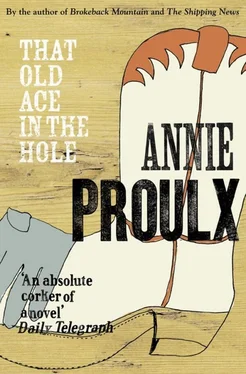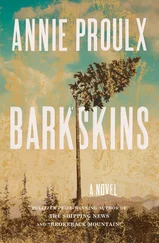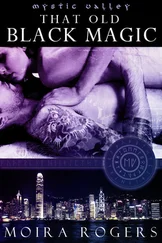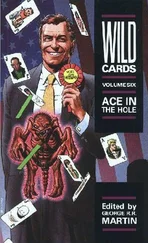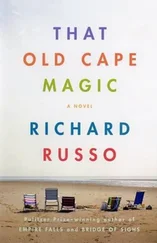He dozed for a quarter of an hour, then woke to a terrific explosion of thunder. He thought for a moment he was back on the train, for he could hear a heavy freight not far away. How had he come to a train yard? There was a mad rattling and balls of icy hail the size of pecans bounded under the wagon. He tried to crawl out from under it but something was blocking the side, something with stiff, wet hair. It took him a few seconds to recognize the feel of his horse. The freight train was passing by just beyond the trees accompanied by a crackling of branches. The trees swayed, one fell. In the flashes of lightning he could see their writhing branches, a confetti of torn leaves, and beyond, some black and immense thing towering like a nightmare. The unseen train, running without lights, curved away into the wet night. To the west a band of colorless sky showed that the next day would be fair. Aching with fatigue and a general sense of malaise he slept again.
He woke early, before the sun was up. The vast sky freckled with small flakes of raspberry-tinted clouds. He crawled out from under the Dearborn and looked at his horse. It was dead.
In a little while he mixed a handful of cornmeal with water in his palm, laid the mass on some gathered leaves to thicken while he made a fire and heated two flat rocks in it. He baked the cornmeal cake on one of the hot rocks, roasted a few coffee beans on the other and pulverized them with the heel of the axe, boiled coffee in the oyster can. The hot can burned his hands and mouth. He strained the floating grounds through his teeth, chewed the escapees. He studied the horse again, thought it might have been struck by lightning as there was a discolored mark on its right shoulder and another near the fetlock.
He hid his trunk as well as he could beneath an overhang of dirt bank, piled torn branches in front of it, heaped rocks. He looked again at his dead horse. Finally he set off west on shank’s mare, guessing that Woolybucket could not be more than two or three miles distant.
Late in the morning a new difficulty assailed him. He could feel the cornmeal cakes and coffee and oysters whirling and sloshing in his gut. His bowels writhed. He thought of Dave Dudley and the clock salesman. For the next few hours he stumbled along with frequent responses to his mad intestines. He abandoned his valise. Soon he began to vomit as well and his head ached violently. In midafternoon he quit and lay on the ground in considerable misery. After an hour, feeling fever roast him on a spit of illness, he thought he smelled smoke. He rolled to his other side and scanned the prairie. Yes, there was smoke coming out of a mound of soil – might it be a volcano? A black rectangle suddenly showed in the face of the mound of earth and a figure moved into it and hurled something that sparkled briefly. The figure turned and disappeared into the dark rectangle that he recognized as an open doorway. He began to crawl toward it and when he was only fifty feet away, two horses in a makeshift corral began to whinny and snort. The door opened a crack and Martin Merton Fronk called out “Help,” in a feeble, choked bleat.
“What the blue burnin hell is that ?” said a voice and a seven-foot gink with white hair wearing a red shirt and too-short California pants came striding out of the dugout with a Winchester in his hands. He was followed by a shorter, younger man, a bench-legged, bullet-eyed rip with a luxuriant but multicolored beard that blew sideways in the wind.
“Who the hell are you and why the blue tarnation are you creepin up on us? You one a them fellas with a sticky rope admires other folks’ horseflesh?”
“Sick. Can’t walk. Meant no harm.” It seemed funny that they saw evil design in him. The talking made him vomit again.
“Christ, you smell like you been shittin yourself as well as losin your okra.”
“Yes. Sick. Sick.” He said a few words about the cornmeal cakes and the dead horse and the sudden diarrhea.
“You get your water at Twospot? Little pond a water there?”
“Yes.”
“That’s squitter water. It’ll make you want a die, make you think your guts is bein pulled out a your asshole with your mama’s crochet hook, but you won’t die and most gets better and some even drinks that squitter water again and has no ill effects. I done it. Anyways, we got the fix-up for it. Just wait here. You ain’t comin into this camp smellin like shit and puke boiled with skunk cabbage for a week. You lay out here folded up like a empty purse and we’ll bring it to you.”
The cure, as they called it, was a tin cup of brown liquid toned up with some kind of cheap whiskey. He drank it and promptly vomited. The man with the multicolored beard fetched a second dose, which he took in tiny sips, willing it to stay down. When the cup was empty he lay in the grass and closed his eyes.
“Give her a hour or two to work,” said the giant and they disappeared into the dugout.
Near sunset they reappeared with a basin of steaming water and some folded garments. They pulled his noisome shirt and pants from him and poured the basin of hot soapy water over him, threw down a flour-sack towel and advised him to get into the fresh clothes.
“My valise …” he said, pointing back the way he’d come.
The tall man said, “Good idee. Why have him stink up our duds with his squitter shit when he can do what he wants with his own?” He saddled one of the horses and rode in the direction of the creek camp. Martin lay naked and cold on the prairie and began to shiver but at least he was no longer racked with spasms. The multicolored beard brought him a biscuit and some clean water.
Before the sun went down the tall man was back with the valise, which he opened and went through with interest. He tossed a pair of pants to Martin and a striped cotton shirt. Martin asked for his spare underdrawers but the man laughed and closed the case.
“Sonny, no man in Texas wears them. Just slows you down whatever you got in mind. I’n use them for a dishclout.”
They gave him a corner in the dugout and the tall man who said his name was Klattner, late of Arkansas, promised – as soon as he learned there were coffee beans in it – that he’d get Martin’s trunk in the morning.
“We been out a coffee a month. Tried to git a little in Woolybucket but they’re out too and no supply wagon due until June. So your coffee will be appreciated. What damn old Woolybucket needs is a good store. The one they got in Woolybucket now, it’s not no good. There’s a crazy doc half runs it when he ain’t layin on a sofa dead drunk. Couldn’t hit a elephant’s ass with a banjo. Used a have a regular storekeeper, but he lost the emporium to the doc in a game of chance. Doc don’t never order enough coffee, flour, sugar, what-have-you. All last winter no flour and no tabacca. My God, he got in a thousand pound a saleratus and not one teaspoon a flour. We horsewhipped him but it didn’t do no good. Bad as ever.”
“Would his name be Doctor Mugg?”
“It would. You know him?”
“No. I was told he was well-regarded at curing sick folks.”
“I don’t know who told you that but the informant was lyin. Doc Mugg couldn’t cure a ham if you gave it to him in front of a smokehouse. What Doc Mugg needs in the cure line is the water cure – for hisself If I was you I’d get better on my own. Fresh air and whiskey is best and plenty work.”
The multicolored beard chimed in. “If I was you I wouldn’t tie up to Doc Mugg for a minute. He’s filled up the graveyard complete and is startin on another. Why don’t you git his store away from him and run it good – run it honorable. Every man would greet you with hearty goodwill wherever you may go.”
But Martin Fronk had fixed his sights on making a fortune as a cattleman, whether drover or rancher, found the idea of running a store repugnant and said so.
Читать дальше
